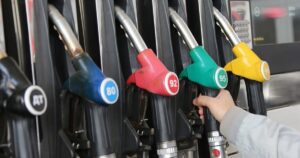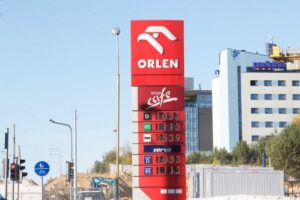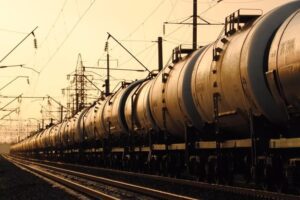
Ukraine imported 760,000 tons of oil products in July, First Deputy Minister of Economy Denis Kudin said.
“Ukraine imported approximately 760,000 tons of gasoline, diesel and autogas. This can be compared with imports of the pre-war period,” he said during a meeting of the Verkhovna Rada’s finance committee.
As reported with reference to Economy Minister Yuliya Svyridenko, in March 2022 Ukraine imported 60 thousand tons of oil products, in April – 191 thousand tons, in May – 380 thousand tons.
According to her, in June it was planned to increase the import of oil products by 1.6 times compared to May – up to 600 thousand tons. In particular, 2/3 of them should be diesel fuel, 1/3 – gasoline and liquefied gas.

The Kernel agro-industrial group plans to supply Ukraine with oil products, fertilizers and other inventory items in order to overcome the shortage of resources for agricultural production in Ukraine, Ihor Stelmaschuk, head of the Kernel commercial department, said at the Fuel for Ukraine international conference.
“Together with partners, we will be able to establish long-term systematic work in the processes of production and supply of fertilizers. And in the future we will build a powerful diversified mechanism for providing Ukraine with oil products, we will meet the fuel needs of agricultural enterprises in a planned and cyclical way,” Stelmaschuk said on the Facebook page of the agrarian group.
According to him, now Kernel is exchanging experience and ideas with key players in the global oil products market.
“We decided on the urgent problems of a resource, logistics and infrastructure nature. We assessed the risks and trends in the fuel market. The country’s future annual demand for diesel fuel is estimated at 4 million tonnes, so Ukrainian consumers need to establish cooperation with Europe right now,” Stelmaschuk stressed.
According to him, due to the full-scale Russian invasion, Ukraine is forced to replace 100% of the pre-war sources of supplies of oil products, which is what Kernel plans to do.
In addition, the agricultural holding is working on projects to provide the agricultural sector with mineral fertilizers, their logistics and transshipment in ports. Kernel stated that it has already signed the first contracts for the supply of fertilizers for the sowing of winter wheat and rapeseed in the autumn, which is especially important given the likely global shortage of fertilizers in autumn 2022 and spring 2023.
Before the war, Kernel ranked first in the world in production of sunflower oil (about 7% of world production) and its export (about 12%), and was also the largest producer and seller of bottled sunflower oil in Ukraine. In addition, the holding was engaged in the cultivation and trade of other agricultural products.

Prime Minister Denys Shmygal asks Denmark to consider the possibility of supplying Ukraine with raw materials needed for farmers and oil products.
“I thanked for the decision to take part in the restoration of the city of Nikolaev together with other international partners. Also, in the coming days, as Prime Minister Matte Frederiksen promised, Ukraine will receive equipment and machinery that will help in the restoration of the liberated cities,” Shmyhal wrote on the Telegram channel following a meeting with Danish Foreign Minister Jeppe Kofodom.
According to him, the parties discussed the supply of military equipment, the tightening of sanctions against Russia and the rejection of Russian energy resources.
“I touched upon the issue of diversifying gas supply sources. I made a proposal to consider the possibility of supplying Ukraine with raw materials needed for farmers and oil products, since the enemy is purposefully trying to disrupt the sowing season and cause a shortage of fuel,” the prime minister wrote.
Among other things, Shmygal thanked Denmark for its strong political and financial support.
“We also count on Ukraine’s support in acquiring the status of a candidate for EU membership and on the approval decision of the European Commission to suspend import duties on all Ukrainian exports for a year,” he added.

The tangible shortage of fuel at filling stations in certain regions of Ukraine, which formed this week, is associated with the enemy’s destructive strikes over the past three weeks on the fuel infrastructure of Ukraine, but this shortage will be eliminated within a week, said First Deputy Prime Minister – Minister Economics Julia Sviridenko.
“Over the next seven days, the deficit will be eliminated, since the operators have contracted volumes in Western Europe and now we are solving the issue of how to import them to the territory of Ukraine as quickly as possible,” she wrote on her Facebook page on Friday.
Sviridenko noted that this situation will lead to a slight increase in the price of oil products. “This is primarily due to the higher cost of logistics due to complex routes and the use of several modes of transport,” the First Deputy Prime Minister explained.
Speaking about the situation on the market, she pointed out that since the beginning of the war, through the Ministry of Energy and the Ministry of Economy, the government has been cooperating on a daily basis with market operators to provide the population and enterprises with oil products. Decisions were made that significantly reduced the impact on the economy of a sharp rise in the cost of petroleum products on world markets, in particular, the excise tax was canceled and VAT was reduced from 20% to 7%.
At the same time, Russia, as an aggressor country, is trying to stop the Ukrainian economy by creating an artificial shortage of fuel, Sviridenko noted. And the destruction of the Kremenchug oil refinery, which was the main producer of fuel in Ukraine, as well as a number of oil depots of market operators with a significant supply of fuel, led to a temporary shortage, which will be eliminated within a week.
As reported, currently the prices for gasoline and diesel fuel are limited by the government to UAH 34.10/l and UAH 38.7/l, respectively. However, according to the director of the consulting group A-95 Sergey Kuyun, the shortage of fuel determines its real price on the market at 40 hryvnia/l and 45 hryvnia/l, despite the government’s setting of marginal prices.

The Polish oil concern Orlen has an actual plan to enter the Ukrainian market of oil products, Energy Minister of Ukraine Herman Haluschenko has said.
“They visited [Ukraine] recently. Unfortunately, I could not meet with them. But I know from my colleagues that they came up with a real plan to enter the Ukrainian market. This is great!” Haluschenko said in an exclusive interview with Interfax-Ukraine.
According to him, the concern is considering the possibility of buying out the networks and entering several segments, in particular, oil refining and petrochemicals.
At the same time, the minister suggested that in this process, some problems may arise, related, in particular, to the shortage of crude oil made in Ukraine.
“They [Orlen] also understand that oil in Ukraine is not a subject of production. We have to get it somewhere… At most, we can buy oil instead of oil products, but what is the point then? And will there be investments in Ukraine if nearby Mazeikiai oil refinery in Lithuania, part of Orlen, and several other refineries are located?” the minister said.
Regarding the state policy on the oil products market as a whole, in his opinion, it consists in the need to change the geography of imports and to carry out import substitution.
“Today, we have a huge percentage of imports – 80% and even more: Russia and Belarus. This is not a completely normal story. Therefore, it is very important to look at partners from other countries and at how much we ourselves can increase refining,” the head Ministry of Energy said.
At the same time, he said that to increase internal processing, it is important to avoid another problem – the transition from an external monopolist to an internal one, which could become the Kremenchuk refinery.
“In fact, our key one is Kremenchuk [Refinery]. By the way, they declare the possibility of increasing processing capacity at least twice. And this [the transition from one monopolist – Russia – to another] can also potentially become a problem,” Haluschenko said.
According to him, to avoid monopoly on the part of anyone, it is necessary to promote increased competition in the market, and the ministry is ready for any steps that will help investors enter the Ukrainian market as soon as possible.
“Where we do not have our own production, we must very carefully build a policy of balance sheets and ensure supplies from different directions. There must be diversification,” the minister said, expressing his conviction and adding that communications are underway with many companies in the oil and gas industry.
At the same time, he said that the creation of minimum reserves of petroleum products will make it possible to balance in the market in case of contingencies.

The European Union has officially published its list of sectoral sanctions against Belarus.
In line with the decision of the EU Council, which was published in the EU’s official journal, the ban on import or transit from Belarus of highly significant export goods for the country, petroleum products and potash fertilizers, applies to contracts signed after June 25, 2021. The EU sanctions thus do not apply to current contracts for supplies of petroleum products and potash fertilizers.
“It shall be prohibited […] to transport petroleum products if they originate in Belarus, or are being exported from Belarus to any other country; to provide, directly or indirectly, technical assistance, brokering services, financing or financial assistance, including financial derivatives, as well as insurance and re-insurance […]. The prohibitions […] shall be without prejudice to the execution of contracts concluded before June 25, 2021, or ancillary contracts necessary for the execution of such contracts,” the document said.
Similar sanctions are envisaged for potash fertilizers from Belarus. “It shall be prohibited to import, purchase or transfer, directly or indirectly, potassium chloride (‘potash’) products […] from Belarus, whether or not originating in Belarus. The prohibitions […] shall be without prejudice to the execution of contracts concluded before June 25, 2021, or ancillary contracts necessary for the execution of such contracts,” it said.
BANS, BELARUS, EUROPEAN UNION, IMPORT, OIL PRODUCTS, TRANSIT